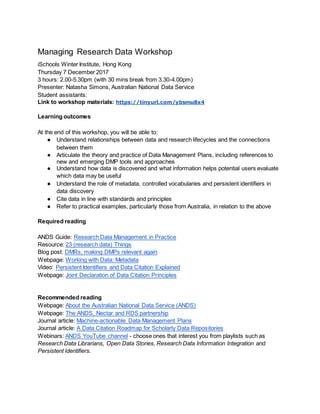Ischools workshop - program
- 1. Managing Research Data Workshop iSchools Winter Institute, Hong Kong Thursday 7 December 2017 3 hours: 2.00-5.30pm (with 30 mins break from 3.30-4.00pm) Presenter: Natasha Simons, Australian National Data Service Student assistants: Link to workshop materials: https://tinyurl.com/ybsmu8x4 Learning outcomes At the end of this workshop, you will be able to: тЧП Understand relationships between data and research lifecycles and the connections between them тЧП Articulate the theory and practice of Data Management Plans, including references to new and emerging DMP tools and approaches тЧП Understand how data is discovered and what information helps potential users evaluate which data may be useful тЧП Understand the role of metadata, controlled vocabularies and persistent identifiers in data discovery тЧП Cite data in line with standards and principles тЧП Refer to practical examples, particularly those from Australia, in relation to the above Required reading ANDS Guide: Research Data Management in Practice Resource: 23 (research data) Things Blog post: DMRs, making DMPs relevant again Webpage: Working with Data: Metadata Video: Persistent Identifiers and Data Citation Explained Webpage: Joint Declaration of Data Citation Principles Recommended reading Webpage: About the Australian National Data Service (ANDS) Webpage: The ANDS, Nectar and RDS partnership Journal article: Machine-actionable Data Management Plans Journal article: A Data Citation Roadmap for Scholarly Data Repositories Webinars: ANDS YouTube channel - choose ones that interest you from playlists such as Research Data Librarians, Open Data Stories, Research Data Information Integration and Persistent Identifiers.
- 2. Workshop program Start 2.30 Introduction to ANDS, workshop outline, whoтАЩs who in the room 2.45 Data in the research lifecycle тЧП Short intro (5 mins) тЧП Hands-on: do Thing 3 - Data in the Research Lifecycle (work in pairs) - 10 mins тЧП Class discussion: How did you find Thing 3? (5 mins) тЧП Presentation: How do Australian institutions support the data lifecycle (10 mins) 3.15 Data Management Plans: тЧП Short intro (5 mins) тЧП Hands-on: do Thing 15 - Data Management Plans (work in pairs) (10 mins) 3.30 Afternoon tea break 4.00 Data Management Plans (conтАЩt): тЧП Class discussion: How did you find Thing 15? (5 mins) тЧП Presentation: Australian DMP tools and approaches (10 mins) 4.15 Data discovery and metadata тЧП Intro presentation: How do people discover data? Includes video (10 mins) тЧП Hands-on: creating a metadata record with only a dataset (CSV file) to go on! (in pairs or groups) (15 mins) тЧП Class discussion: How did you go with the exercise? Time to see the real metadata records for these datasets. (5 mins) тЧП Presentation: Australian examples of data discovery portals. (15 mins) 5.00 Data citation and impact тЧП Intro - includes video (5 mins) тЧП Hands-on: do Thing 7 - Data citation for access and attribution (work in pairs) - 10 mins тЧП Class discussion: How did you find Thing 7? (5 mins) тЧП Some useful data citation tools 5.20 Bringing it all together тЧП Review and reflection: One thing you have learnt? One thing you will do? 5.30 Close


